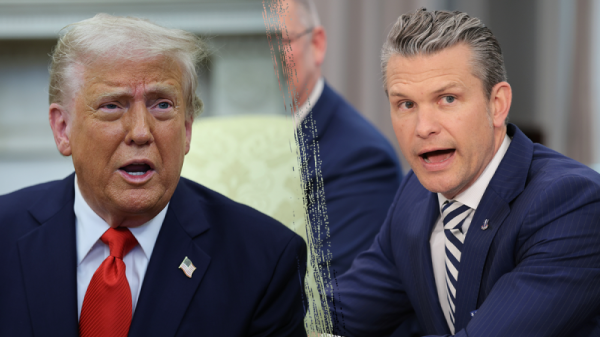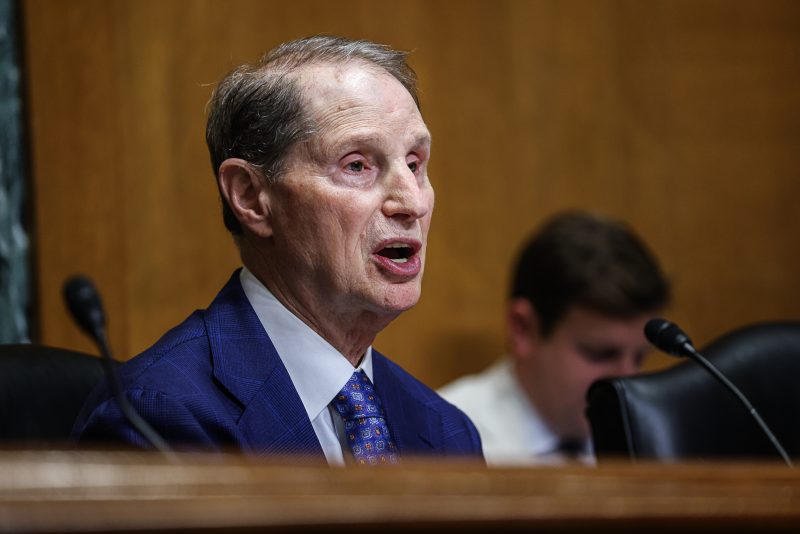A sweeping bill introduced by a Democratic senator Wednesday would greatly increase the size of the Supreme Court, make it harder for the justices to overturn laws, require justices to undergo audits and remove roadblocks for high court nominations.
The legislation by Sen. Ron Wyden (D-Ore.) is one of the most ambitious proposals to date to remake a high court that has suffered a sharp decline in its public approval following a string of contentious decisions and ethics scandals in recent years. It has little chance of passing at the moment, since Republicans have generally opposed efforts to overhaul the court.
Wyden, who chairs the Senate Finance Committee, said the goal of the bill is to restore public confidence in a battered institution. He said he hopes to get parts of the bill passed, even if the whole package is not embraced by fellow legislators.
“It’s not an atomic secret that the process for selecting justices is politicized,” Wyden said. “You’ve got this thoroughly politicized process resulting in a Supreme Court that now frequently issues sweeping rulings to overturn laws and upend precedents. We are proposing a way to restore some balance between the three branches of government.”
The bill’s most significant measure would increase the number of justices on the Supreme Court from nine to 15 over the course of 12 years. The staggered format over two or three administrations is aimed at diminishing the chance that one political party packs the courts with its nominees.
Each president would approve justices in the first and third year of their terms during the rollout.
The bill would also require a ruling by two-thirds of the high court and circuit courts of appeals, rather than a simple majority, to overturn a law passed by Congress. Wyden said the current court has been too quick to discard precedent and curtail rights by narrow majorities.
The legislation would also require Supreme Court nominees to be automatically scheduled for a vote in the Senate if they have lingered in committee for more than 180 days.
The measure would prevent senators from blocking a president’s nominees by refusing to hold a vote on them, as then-Senate Majority Leader Mitch McConnell (R-Ky.) did following President Barack Obama’s nomination of Merrick Garland in 2016.
McConnell held open the seat that had been occupied by conservative Justice Antonin Scalia until Donald Trump became president. Trump put forward Neil M. Gorsuch.
McConnell said Garland’s nomination came too close to the 2016 presidential election, but he later helped push through the nomination of Amy Coney Barrett in the waning months of Trump’s presidency, after liberal Justice Ruth Bader Ginsburg died. Democrats accused McConnell of hypocrisy.
The moves helped create the conservative supermajority that now dominates the court.
Another provision in Wyden’s bill would expand the number of federal judicial circuits from 13 to 15, adding more than 100 district court judges and more than 60 at the appellate level.
Supreme Court justices must report income, dividends, property sales and gifts among other things, but the bill would bolster financial checks, disclosures and other transparency measures. It would require the IRS to initiate an audit of the justices’ tax returns each year, release the results and make the tax filings public. Nominees to the court would have to disclose three years of tax returns.
Another measure would allow a two-thirds vote of the court to force a fellow justice to recuse from a case.
Each justice would be required to publicly release their opinions and disclose how they voted on issues considered on an emergency basis, sometimes referred to as the shadow docket. Such decisions, which have become more common and increasingly controversial in recent years, don’t identify how each justice voted.
Jeremy Fogel, executive director of the Berkeley Judicial Institute a former federal judge and a judicial ethics expert, said expanding the court to 15 justices might improve the administration of the high court and cool the rancorous politics around nominating justices.
“Canada is a fraction the size of United States in terms of population and it has 15 justices,” Fogel said. “Most of the larger democracies in the world have bigger apex courts than we do.”
He added that the current makeup of the Supreme Court “gives those justices an outsize amount of power. It makes each appointment a big to-do in terms of the confirmation process.”
Wyden’s bill, like others introduced by Democrats to bring changes to the Supreme Court, faces long odds of passing. Republicans, who control the House of Representatives, say the bills aren’t about reform but politics. They believe Democrats are trying to undermine a high court that has delivered conservatives a string of major victories in recent terms.
Other bills introduced by Democrats recently would add teeth to the Supreme Court’s ethics code, which has been widely criticized for lacking an enforcement mechanism. Another would cap gifts justices can receive at $50, the same limit members of Congress must abide by. Others would establish 18-year term limits for justices and try to drain politics from nominations to the high court.
Sens. Sheldon Whitehouse (D-R.I.) and Catherine Cortez Masto (D-Nev.) reintroduced a bill Wednesday that would give Congress greater latitude to check Supreme Court rulings.
In July, President Joe Biden sharply criticized the Supreme Court and announced he supported a binding ethics code and 18-year term limits for justices. Biden also called for a constitutional amendment that would prohibit blanket immunity for presidents, following a ruling by the Supreme Court in July that extended wide protection to former presidents against prosecution of official acts.
Liberal Justices Elena Kagan and Ketanji Brown Jackson have also said publicly they support a binding ethics code, but Gorsuch has expressed skepticism. The other justices have not made their opinions known.
The calls for reform have followed a string of ethics controversies swirling around the justices, including failing to disclose lavish travel funded by wealthy benefactors, a spouse flying politically charged flags and a justice reportedly using court staff to promote a book.
A Gallup opinion poll from July showed public approval of the Supreme Court is near record lows, with only 43 percent of Americans approving and 53 percent disapproving.
Polls have found there is significant support for some Supreme Court overhauls. A USA Today/Ipsos poll from August found 75 percent of Americans supported a binding ethics code for justices and 61 percent supported 18-year time limits. The poll found only 40 percent approved of expanding the court from nine to 15 justices.
Supreme Court justices and federal judges are under new financial reporting rules that were announced Monday by the Judicial Conference’s Committee on Financial Disclosures. Members of the judiciary are not required to disclose stays at a personal residence of the host, even if the personal residence is owned by a corporate entity.
The rules change follows reports by ProPublica and other media outlets that Supreme Court Justice Clarence Thomas for many years did not disclose private jet travel and luxury vacations funded by his friend and benefactor Harlan Crow, a Dallas billionaire.
ProPublica reported in 2023 that Thomas frequently vacationed at Camp Topridge, an invitation-only lakeside resort in Upstate New York where guests stay free. The resort is owned by Topridge Holdings LLC, a holding company owned by Crow. Under Monday’s updated personal hospitality exemption, Thomas would probably not have to report a stay at the resort or on Crow’s superyacht, the Michaela Rose, which is owned by another Crow holding company.
“This watered-down guidance protects Justice Thomas and his gaggle of fawning billionaires, not the American people,” a spokesperson for Sen. Dick Durbin (D-Ill.), chairman of the Senate Judiciary Committee, wrote in an email.


































